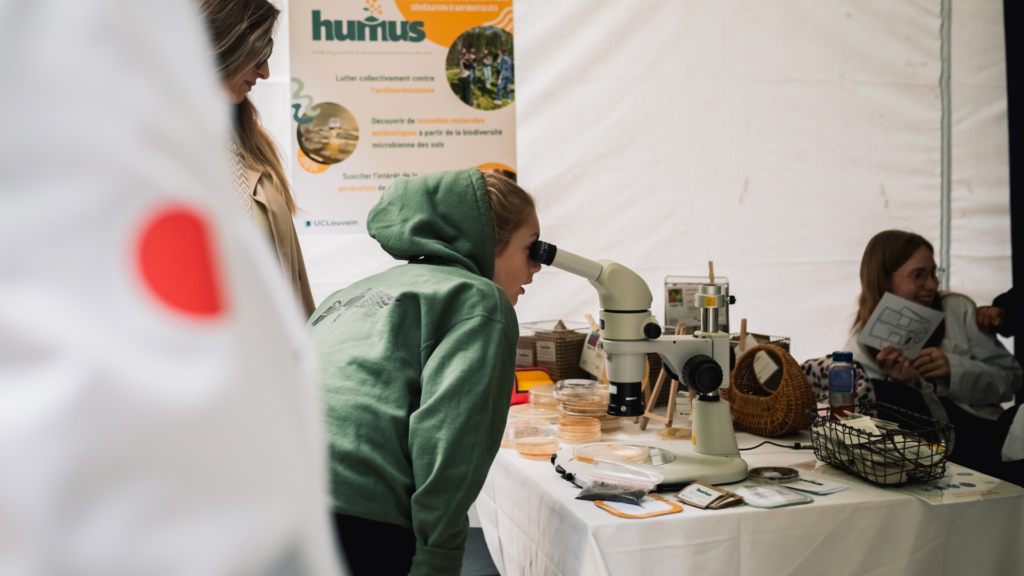UCLouvain’s HUMUS Project Links Soil Health to Antibiotic Resistance in Pioneering Belgian Research

Brussels, The Gulf Observer: At Brussels’ regional Iris Festival last weekend, visitors got a closer look at one of Belgium’s most innovative public health projects — the HUMUS Healthy Municipal Soils Project, based at UCLouvain. The initiative, presented in a dynamic exhibition, brings a fresh lens to the global health crisis of antibiotic resistance, tying it to the health of our most overlooked resource: soil.
Backed by the European Union’s Horizon Europe programme and led by a team of four UCLouvain researchers under Professor Jean-François Collet, HUMUS seeks to unlock the potential of municipal soils in the race to develop the next generation of antibiotics.
The Rising Threat of Resistance
According to the World Health Organization, antibiotic-resistant bacteria could lead to 10 million deaths annually within 25 years if current trends continue. In Belgium alone, over 13,000 infections linked to resistant bacteria have already been reported, based on data from the European Antimicrobial Resistance Surveillance Network.
The challenge is pressing. Since the discovery of penicillin less than a century ago, antibiotic development has slowed dramatically, while bacteria have grown more formidable — especially two major bacterial groups with complex cell envelopes that make them extremely tough to eliminate.
Collet, a longtime leader in microbial research and a recipient of the Joseph Maisin Award in 2020, has been at the forefront of attempts to deconstruct bacterial defense systems, with his lab focused on finding novel antioxidant mechanisms to defeat microbial resistance.
Soil as the Solution?
Drawing inspiration from the 2021 ‘Soils for Science’ initiative in Brisbane, the HUMUS project is exploring soil as a potential goldmine for antibiotic discovery. “The diversity of bacteria in our soil holds secrets we’re only beginning to understand,” Collet shared in a recent interview. “Some of those bacteria may already possess natural antibiotic capabilities — we just have to find them.”
So far, the HUMUS initiative has partnered with 18 organizations, including Agroecology Europe, and assigned €600,000 to support 20 pilot projects involving over 300 stakeholders — from municipalities and NGOs to public research centres and farmers.
At the HUMUS General Assembly in Gabrovo, Bulgaria, local governments signed the EU Mission Soil Manifesto, a key milestone in advancing soil regeneration and health governance. The mission’s broader goal is to establish 100 “living labs” and “lighthouses” across Europe by 2030 to lead the charge toward healthy soils — and, in turn, healthier populations.
Citizen Science at the Forefront
What sets HUMUS apart is its interactive, public-facing approach. Belgian citizens can download a dedicated app to order soil testing kits, collect samples from their own gardens, and send them to UCLouvain labs. The bacteria are grown in Petri dishes, and digital scans of their unique growth patterns are uploaded to an open database.
Participants receive a QR code that links to their soil’s profile, turning a scientific process into an educational, aesthetically engaging experience.
This citizen science approach serves a dual purpose: it amplifies public awareness of the antibiotic resistance threat while also broadening the research’s scope by collecting diverse soil samples from across Belgium.
Funding & Future Prospects
While still in its early stages, the HUMUS project has already shown promising signs. The team is currently seeking €120,000 in additional funding by summer’s end to sustain and expand their work.
“The danger is real — not theoretical,” Collet warns. “Even routine surgeries could become life-threatening if antibiotic resistance continues unchecked. This is not just a scientific mission — it’s a societal imperative.”
As the project moves forward, HUMUS represents not just a research initiative, but a model for inclusive, cross-sectoral collaboration — one where scientists, citizens, and policymakers can unite around a shared commitment to soil health, innovation, and global public safety.


